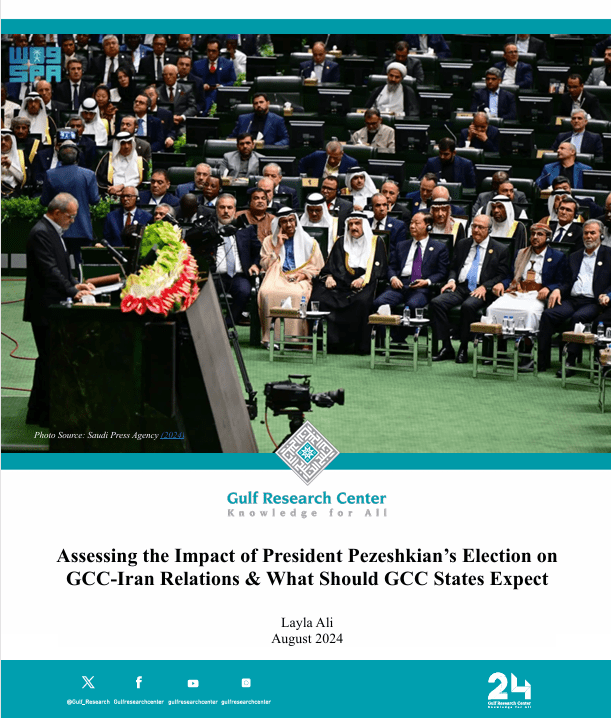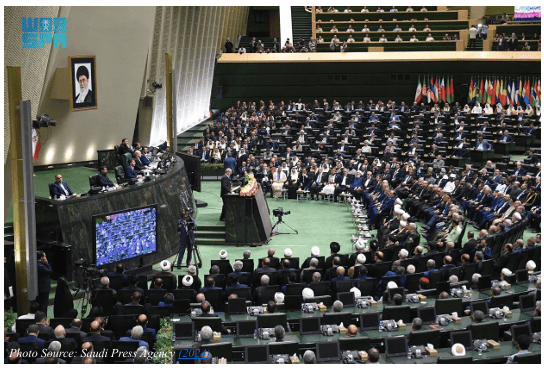Select any text and click on the icon to listen! ByGSpeech
ByGSpeech
 ByGSpeech
ByGSpeech ByGSpeech
ByGSpeech
The inauguration of the Republic of Iran's newly elected president, Masoud Pezeshkian, on July 30th, 2024, marks a moment in regional politics with potential implications for GCC-Iran relations. Masoud Pezeshkian's election as president of Iran has raised questions regarding the direction of Iranian foreign policy, especially in light of the attention that his pledge during the campaign to engage in "constructive engagement" with the outside world has garnered. Many are curious as to whether President Pezeshkian will make significant adjustments to Iranian regional policy.
First indications can be gathered from the formation of his new government, which includes reformist candidates for ministers. For example, it is expected that Abbas Aragchi, Iran's former senior nuclear negotiator, will be named as Foreign Minister while Mohammed Reza Aref, an assistant to the late reformist president Mohammed Khatami, will be named as First Vice President. With Abbas Araghchi's appointment, the approach to neighboring Gulf states is likely to be one of cautious pragmatism. His tenure as a former Iranian deputy foreign minister and chief negotiator in the Joint Comprehensive Plan of Action (JCPOA) highlights his capacity for key regional files. If appointed, the Gulf states expect Tehran's foreign policies to prioritize reducing regional tensions and seeking cooperative frameworks with the GCC states by addressing security concerns and promoting stability in the Gulf region, signaling a potential shift towards more constructive engagement with the GCC.
Concerns over Iranian foreign policy extend beyond the country's nuclear program to include its proxy wars and relationships with extremist organizations throughout the Middle East. Since the creation of the Islamic Republic in 1979, Iran has supported armed non-state actor groups throughout the Middle East, mainly through the 200,000-member Islamic Revolutionary Guard Corps (IRGC). As far as regional policy is concerned, the Iranian government's structural and systematic operations are predominantly controlled by the Supreme Leader's office and the IRGC, particularly its Quds Force. The Supreme Leader, Ayatollah Ali Khamenei, wields ultimate authority over all branches of government, the military, and the media. This centralization of power ensures that the Supreme Leader's directives take precedence over any other governmental or political entities, including the presidency. The IRGC's Quds Force, tasked with overseeing Iran's operations of a network of proxies known as the Axis of Resistance, plays a crucial role in formulating and executing the country's regional policies. This component is instrumental in advancing Iran's strategic interests across the Middle East, which stretches across the Palestinian territories, Lebanon, Iraq, Syria, and Yemen by supporting allied militias and orchestrating military initiatives that align with the regime's ideological goals.
This centralized control allows for a cohesive and assertive approach to regional strategy, often prioritizing ideological and security interests over diplomatic or economic considerations. The integration of these entities into the state apparatus ensures that their influence remains robust and pervasive, securing their role as the dominant forces in Iran's political landscape. As such, it does not come as a surprise that one of President Pezeshkian's first actions in office was responding to a letter from Hassan Nasrallah, the Secretary-General of Hezbollah, in which he reassured Nasrallah that "support to the resistance is deep-rooted in Iran's core policy." This signals Tehran's continuous policy of backing allied non-state actors in the region.
What this underlines is that divisive issues remain. One main concern for Saudi Arabia is Iran's commitment to non-interference policies in the Kingdom and the wider Arab region. Saudi Arabia continues to emphasize that bilateral discussions should stress "the necessity of non-interference in internal affairs'' and that regional security issues must be part of continued talks. From the Saudi perspective, there remains the need for Tehran to review its regional policies and to clearly show that the Islamic Republic is ready to pursue a more cooperative relationship. Yet, the reality has shown that elected presidents in Iran have limited influence over regional policy.

Nevertheless, President Pezeshkian has the opportunity to begin the process of reshaping Iran's regional policy and address longstanding tensions with its Gulf neighbors. This transition offers a unique moment for Iran to engage in renewed diplomatic efforts with the GCC states, fostering dialogue and cooperation on mutual concerns such as security, trade, and regional stability. By leveraging this change in leadership, Tehran can pursue a more substantive and constructive relationship with the Gulf states, aiming for a collaborative future that benefits both sides.
Despite any potential changes in the Iranian presidency, the core strategic and ideological objectives guiding Iran's actions will likely remain consistent. Regardless of presidential elections, the Gulf states and other regional actors should not expect substantial changes in Iran's approach. The continuity of policy stems from the unyielding control exerted by the Supreme Leader and the IRGC, ensuring that strategic directives remain consistent and aligned with the established objectives of Iran's ruling elite. The bottom line is that an overall realization exists that despite the history of animosity and frayed ties, a new page must be turned if regional stability is to stand a chance.
Layla Ali is a Researcher at the Gulf Research Center (GRC)